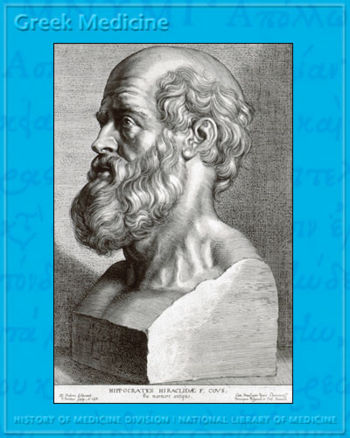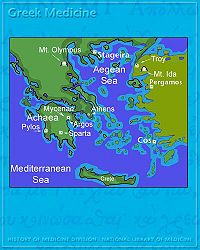Hippocrates
History has bestowed on Hippocrates (Ἱπποκράτης) (c. 460–c. 370 BCE), practicing physician, student and teacher of medicine in ancient Greece, the honorific cognomen, "The Father of Medicine", inasmuch as his contributions to medicine known through his writings, and those of his disciples (the 'Hippocratics') of about 200 years following his death, influenced the practice of Western medicine to the present day (first decade 21st century CE).
Hippocrates came into the world according to tradition on the island of Cos (or Kos) in the Aegean Sea off the west coast of Ionia (Asia Minor, present day Turkey), hence historians often referred to him as 'Hippocrates of Cos'. His father, Heraclides, practiced medicine employing ancient ideas of supernatural causation and treatment of disease according to the tradition of the god of healing, Asclepius. Hippocrates, though known also as 'Hippocrates Asclepiades', possibly a family name, sparked a revolution in medicine leading to a non-supernatural Western scientific medicine . He lived during the Golden Age of Greece (~500 – ~300 BCE). His life overlapped that of Socrates and Aristotle and spanned that of Plato, but historians know little of his personal life. History gave his name to an oath of medical ethics called the Hippocratic Oath.
Because historians know so little about the life of Hippocrates, and because of the great influence he and his disciples have had on medicine for millennia, his fame as a physician has led to a plethora of writings about him that have the character of legend:
We still know very little about Hippocrates. And yet, like the physicians of Imperial Rome, the doctors of our days want to know all about the life of the "Father of Medicine." Where there are no historical sources available, imagination will step in, and the poet will replace the historian.[1]
Hippocrates founded a school of medicine known by his name, and advocated a basic approach to the diagnosis and treatment of disease that still has applications in modern medicine. "The code of conduct for doctors outlined in the Hippocratic Oath, a vow commonly taken by modern doctors", remains an ethical guideline in medicine.[2]
The emergence of Hippocratic medicine
Early Greek medicine operated as a supernatural, magical art. The god of healing, Asclepius (Aesculapius in Roman terminology), [3] whose priests and temples flourished in ancient Greece at least from the Homeric era, appeared in the dreams of the sick who came to the temple for 'sleep therapy'. Asclepius gave advice to the dreamer, which the priests interpreted. The priests prescribed baths, diets, exercises, changes in occupation or living locales, and other routines, and those prescriptions received credit when cures occurred. The cult of ‘therapeutic dreaming’ persisted in various places even into Christian times.
Hippocratic medicine developed as the "naturalistic counterpart" of the Asclepian supernaturalistic tradition.[4] By the 6th century BCE (the 500s BCE) Greek philosophers emerged and began to theorize about the natural causes of the way the world worked. Empedocles (ca. 495-435 BCE), characterized as a physician and philosopher, postulated earth, air, fire and water as the primordial elements of which everything in the world consisted, in differing combinations and kinds of combinations, including the human body.[5] [6]
The development of Hippocratic medicine, its [Aesculapian medicine’s] naturalistic counterpart, is considered a turning point in the history of the healing arts although, as we have seen, at about the same time, naturalistic medical paradigms were developing in other ancient civilizations as well. The importance of Hippocratic medicine rests on the fact that it is the first comprehensive naturalistic medical system of the Western world and therefore the source from which scientific medicine would eventually originate.[4]
Indeed, the development of Hippocratic medicine may have influenced changes in the persisting Asclepian practice.[7]
Likely inspired by Empedocles’ concept of four elements making up natural things, the concept of four humours (blood, yellow bile, black bile, phlegm) as constituent elements of the human body emerged as part of the Hippocratic tradition, the individual humours in various combinations determining state of health and personality:
- excess blood makes a person ‘sanguine’, full of energy, optimistic, ruddy complected
- excess yellow bile makes a person ‘bilious’, ‘choleric’, bad tempered, quick to anger, irritable
- excess black bile makes a person ‘melancholic’, deeply and long-lastingly sad
- excess phlegm makes a person ‘phlegmatic’, unemotional, temperamentally slow, calm
Historians have not identified an individual who originated the four humours theory, nor have they excluded the possibility that the theory gradually emerged into a formal theory. [8]
The medical corollary of Empedocles' theory is the identification of the traditional humours with constituent elements: what made this possible was the presence, in the traditional view of humours, of positive characteristics. Because of these characteristics it was easy to conceive the humours as the ingredients of man, upon which his normal or healthy state, as well as his very existence, depended….It is not the recognition of this or that humour as existing which counts, but the theoretical use to which that humour is put. One would therefore also have to find evidence….that the humours were regarded as constituent parts of the human body. There seems no a priori reason why this should not have been the case, in any writer working after say 450. But in the absence of such evidence, the question of the precise originator of the four-humoral theory is formally insoluble….What is perhaps of more interest is the way in which the theory of four humours exemplifies the stimulating effects of Greek philosophy on Greek medical science. It may be described in this way: the philosopher provides the categories within which the medical scientist can order his experience.” Page 61[8]
References and notes cited in text
- ↑ Sigerist HE. (1934) On Hippocrates. Bulletin of the History of Medicine 2:190-214.
- ↑ "Hippocrates of Cos" in Scientists: Their Lives and Works, Vols 1–7. Online Edition. U*X*L, 2004. Reproduced in Biography Resource Center. Farmington Hills, Mich.: Thomson Gale. 2007. Document Number:K2641500095.
- ↑ Greek Medicine. History of Medicine Division, National Library of Medicine, National Institutes of Health
- Note: From the website” “Asclepius did not begin as a god, however. It is now thought that he was an actual historical figure, renowned for his healing abilities. When he and his sons, Machaon and Podalirios, are mentioned in The Iliad in approximately the 8th century B.C.E., they are not gods. As his "clan" of followers grew, he was elevated to divine status, and temples were built to him throughout the Mediterranean world well into late antiquity .”
- ↑ Jump up to: 4.0 4.1 Prioreschi P. (1996) The History of Medicine. Volume II: Greek Medicine. 2nd ed. Horatius Press, Omaha. ISBN 1888456027
- ↑ Scoon R. (1928) Greek Philosophy before Plato. Princeton University Press. Princeton, NJ.
- ↑ Parry, Richard, "Empedocles", The Stanford Encyclopedia of Philosophy (Spring 2005 Edition), Edward N. Zalta (ed.), URL = <http://plato.stanford.edu/archives/spr2005/entries/empedocles/>.
- ↑ Pettis JB. (2006) Earth, Dream, and Healing: The Integration of Materia and Psyche in the Ancient World. Journal of Religion and Health, Vol. 45, No. 1
- "Hippocrates’s concerns himself specifically with the study and treatment of the human body, thus separating medicine from philosophical speculation about the natural world such as atomic theory in the thought of Epicurus (371–270 BCE). Apparently, Hippocrates had direct association with the Asclepius temple at Cos, and according to A. J. Brock, he revitalized the Asclepius temple system of his time ([cites] Brock 1916, x)."
- ↑ Jump up to: 8.0 8.1 Lonie IM. (1981) The Hippocratic Treatises; "On Generation"; "On the Nature of the Child"; "Diseases IV": A Commentary. Walter de Gruyter, Berlin & New York. ISBN 3110079038

